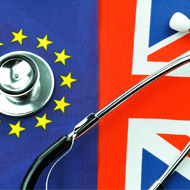Brexit report highlights animal welfare concerns

The report highlighted the ‘key role’ played by skilled veterinary surgeons in inspecting health and welfare on farms, abattoirs and in transport.
Brexit could result in UK farmers competing against cheap imported food from countries with lower animal welfare standards. This is according to a new report, which warns that this is the biggest threat facing farm animal welfare post-Brexit.
The report, published by the EU Select Committee, explains that high welfare could be a selling point but it may also increase production costs. This problem could be exacerbated if UK consumers are unwilling to pay more for higher welfare products, resulting in UK farmers becoming uncompetitive and putting the UK’s welfare standards under pressure.
‘In the event that post-Brexit trading relations with the wider world… lead to increased imports from countries operating lower farm animal welfare standards, UK producers could become uncompetitive,’ the committee concluded.
‘This could undermine the sustainability of the industry or incentivise a race to the bottom for welfare standards—contrary to the wishes of the UK industry.’
The committee urged the government to negotiate provisions for farm animal welfare in future free trade agreements. However, there is some doubt over whether animal welfare can be used as a rationale to restrict imports from other countries under World Trade Organisation (WTO) rules; so this is something the government must explore.
Simpler labelling was also recommended to help consumers make more informed choices on welfare. Farm assurance schemes are another way to instil confidence in UK food products, and the government should encourage uptake of such voluntary schemes.
Currently, much farm animal welfare research is funded through the EU, which could leave a ‘major funding gap’ after Brexit. Withdrawal from the EU must not lead to a shortfall in research, the report adds, and the government must put in place a strategy to prevent this.
The report also highlighted the ‘key role’ played by skilled veterinary surgeons in inspecting health and welfare on farms, abattoirs and in transport. It points out the heavy reliance on workers from other EU countries, and says the government must maintain access to the staff and skills needed to support good welfare and certify animals in the context of trade.
Ultimately, existing EU laws on farm animal welfare must be transposed into domestic law so that they are effective on day one after Brexit. Thereafter, the report suggests the government should consider whether to improve these laws, in consultation with the industry, consumers and other relevant stakeholders.



 The BSAVA has opened submissions for the BSAVA Clinical Research Abstracts 2026.
The BSAVA has opened submissions for the BSAVA Clinical Research Abstracts 2026.